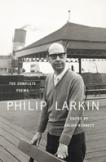Begin Afresh
I am not sure if the English poet Philip Larkin (1922-85) ever behaved in public as badly as many other poets have done, but he did so privately and plenteously, to judge from his letters, biographies and unpublished poetry. For a while it was the thing to disparage his work from the point of view of political correctness. You could argue he was sexist, racist, anti-Catholic, anti-Semitic, etc. He was a poetic Dirty Harry; he hated everyone—except schoolgirls in plaid skirts, about whom he wrote a bit of soft pornography.
And yet the man was more than this. He wrote some of the most beautiful lyric poetry of the 20th century. So you can focus on the life if you want to tear the man down, or you can read his poetry and experience the harrowing beauty of what he wrote, for example this stanza from “High Windows,” which comes after the narrator has been wondering if anyone ever looked at him and wished he or she had been free of God and “sweating in the dark”:
And immediately
Rather than words comes the thought of high windows:
The sun-comprehending glass,
And beyond it, the deep blue air, that shows
Nothing, and is nowhere, and is endless.
Archie Burnett, co-director of the Editorial Institute and professor of English at Boston University, has produced a tome indispensable for those who love Larkin’s poetry and for any aspiring or practicing poet. The four books Larkin published in his lifetime—The North Ship (1945), The Less Deceived (1955), The Whitsun Weddings (1964) and High Windows (1974)—are here but also all his uncollected, unpublished and undated poems.
The commentary by Burnett following the poems can be heavy slogging, but only a scholar or poet interested in compositional details would bury himself in the subsections about dates, text and influences. More interesting for the general reader are the many quotations from Larkin’s letters, prose and interviews that refer to the poems themselves.
Larkin said, for instance, about “High Windows,” quoted above:
I think the end shows a desire to get away from it all.... I don’t think it very good: I called the book after it because I liked the title. It’s a true poem. One longs for infinity and absence, the beauty of somewhere you’re not. It shows humanity as a series of oppressions, and one wants to be somewhere where there’s neither oppressed nor oppressor, just freedom. It may not be very articulate.
This is a frequent refrain; Larkin often disparaged himself and his work. He was hard on the world in general yet honest about this hardness; he was also honest about the light he could see, seldom but exquisitely, through high windows. His work sometimes reminds me of the line from Gerard Manley Hopkins that despite all that we have done to the earth, “There lives the dearest freshness deep down things.”
Hopkins was one of the poets whose work Larkin kept “within reach.” Echoes of his work can be heard in my favorite Larkin poem, “The Trees” (which Larkin later thought “bloody awful tripe”):
The trees are coming into leaf
Like something almost being said;
The recent buds relax and spread, Their greenness is a kind of grief. Is it that they are born again And we grow old? No, they die too. Their yearly trick of looking new Is written down in rings of grain. Yet still the unresting castles thresh In fullgrown thickness every May. Last year is dead, they seem to say, Begin afresh, afresh, afresh.
Besides the poems and commentaries themselves, what makes this volume especially valuable for a working poet is the second appendix, “Dates of Composition,” in which is laid out a table “designed to give a sense of what Larkin was working on at a given time.....” One could go through it year by year, read the poems, then the commentaries and have a complete picture of the poet’s working life.
Larkin was not always an admirable man, but he was certainly a hard-working poet. He deserves to have his Complete Poems presented by such a hard-working scholar as Archie Burnett.
This article also appeared in print, under the headline “Begin Afresh,” in the September 10, 2012, issue.








